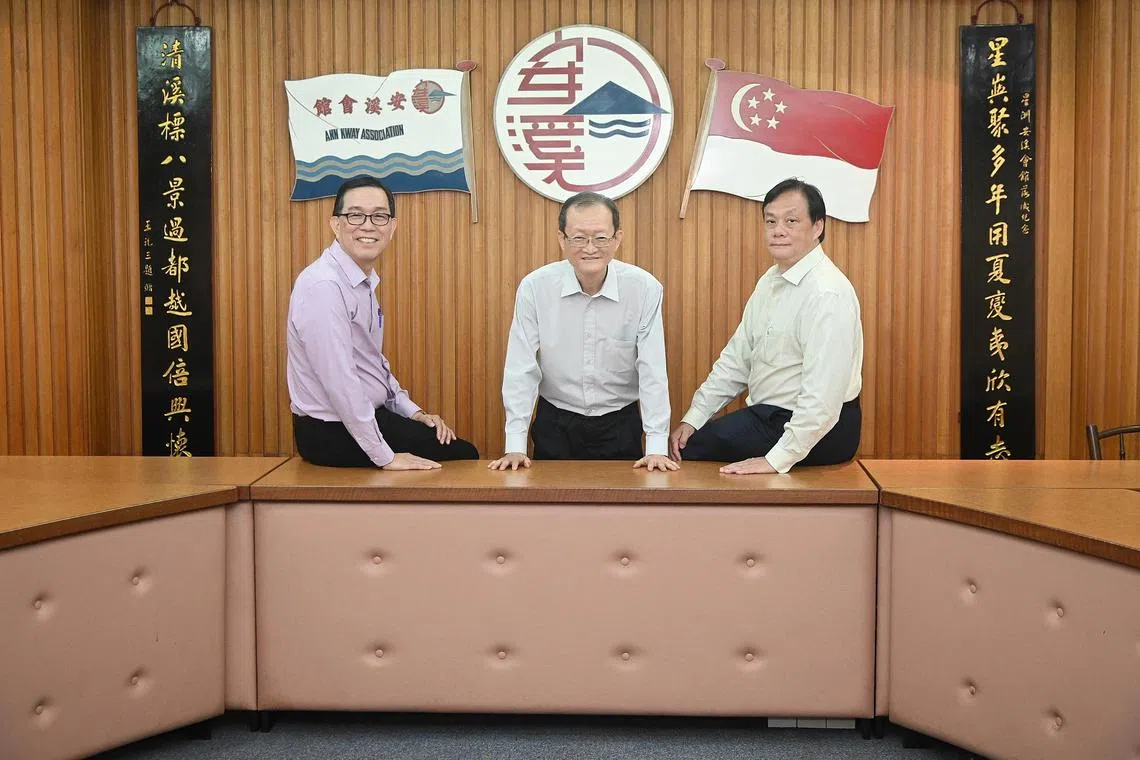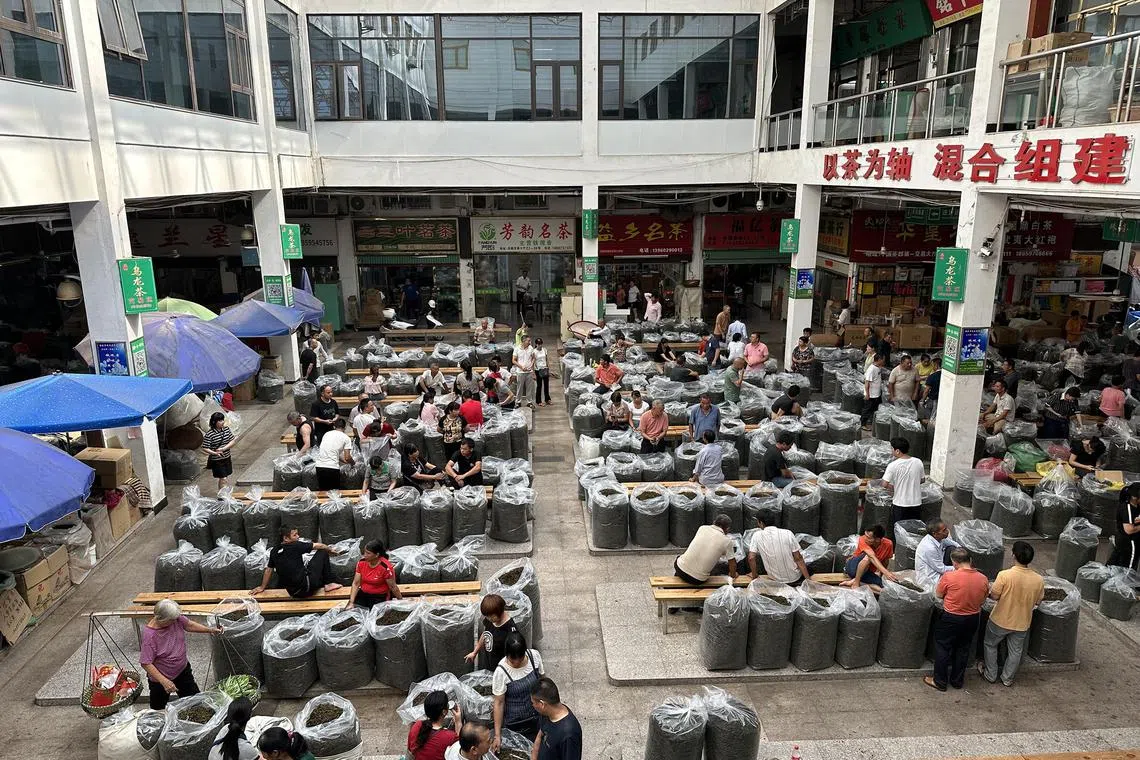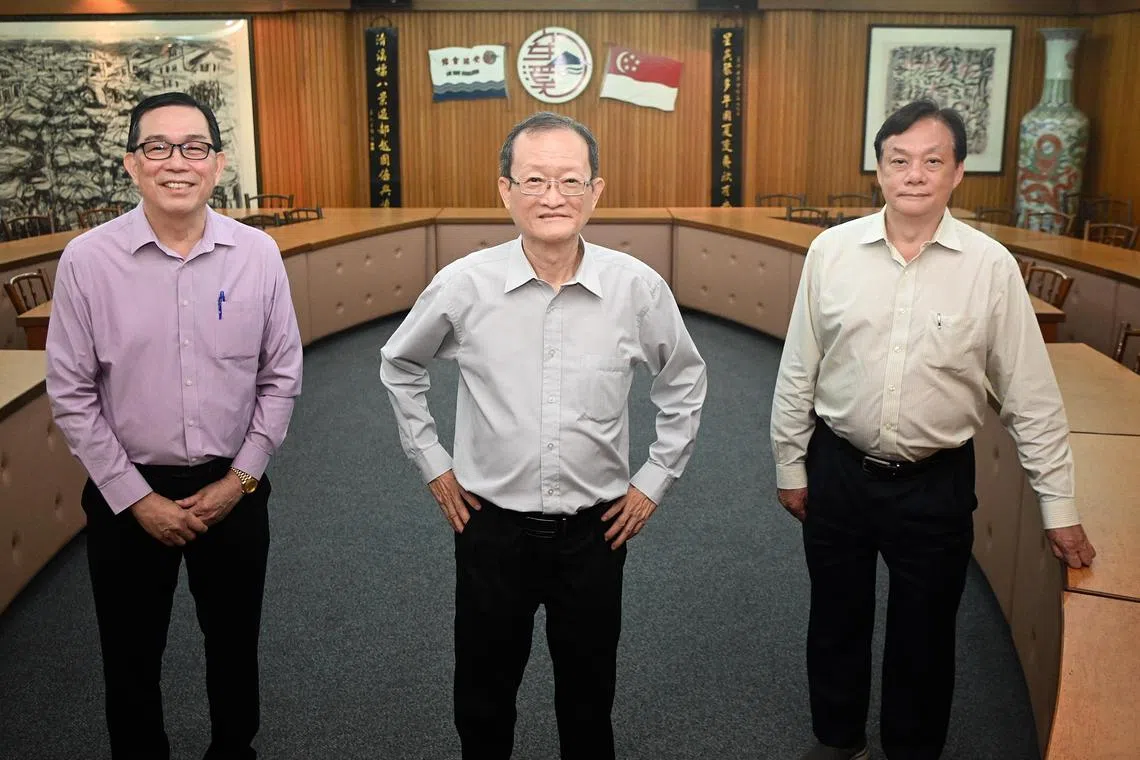Clan associations say they are stringent with memberships, push back against negative epithets
Sign up now: Get ST's newsletters delivered to your inbox

Singapore Ann Kway Association's (from left) general secretary Or Teck Seng, chairman Yeo Hoon Chong and second vice-chairman Poh Po Lian.
ST PHOTO: DESMOND WEE
SINGAPORE - Alarm bells went off in Mr Yeo Hoon Chong’s head when he was invited to meet three businessmen at their downtown Chinese restaurant three years ago.
The trio, who were from Anxi county, offered to donate funds to the Singapore Ann Kway Association in exchange for honorary titles in the clan association.
Mr Yeo, who chairs the clan association, turned down their offer as membership is open only to Singapore citizens and permanent residents of Anxi ancestry. Honorary titles and committee membership are reserved for those with a good track record and years of contributing to the association, which marked its 100th anniversary last December.
He suspected that the businessmen had offered him the quid pro quo to gain quicker access to local citizenship or permanent resident status. Mr Yeo, 67, said he invited them to join Ann Kway’s monthly lunch sessions instead, but they showed no interest.
Following police revelations of the billion-dollar money laundering case here, some clan association leaders have expressed relief at having kept out questionable characters from their organisations, but also disappointment over the broad-brush characterisation of people who hail from Anxi.
In August, in one of the biggest anti-money laundering operations here, the police arrested 10 foreigners
The group of foreign nationals is allegedly involved in laundering proceeds from organised crime activities overseas, such as scams and online gambling. Several of them originated from Anxi,
Businessman Wang Quancheng said the involvement of some Anxi people in the money laundering case should not be cause to stigmatise a whole group of people.
The 58-year-old is president of the Hua Yuan Association, which has 6,000 members who are mostly new Singapore citizens and permanent residents from China.
He said a recent report in local Chinese media that described Anxi as a “fraudsters’ home town” had hurt the people of Anxi deeply, including himself and many members of the association who are first-generation immigrants from Anxi.
Anxi county in southern Fujian province is a tea capital known for its Iron Buddha (Tieguanyin) tea.

A tea wholesale market in Anxi city centre.
ST PHOTO: ELIZABETH LAW
It gained notoriety for cheats masquerading as fortune tellers and businessmen to defraud others in sham business deals, said a 2016 report by the official Xinhua news agency.
Media reports also said Fujian has long been linked to crime, from “snakehead” organisations that smuggled people into the United States by boat in the early 1990s, to telecommunications and online scams in more recent years.
Those of Anxi ancestry form a large part of Singapore’s Hokkiens, which is the biggest Chinese dialect group at around 45 per cent of the Chinese community here.
Ann Kway’s Mr Yeo said it pained him and many members, as well as their counterparts in Anxi, to read reports describing the county as the heart of criminal activities.
He acknowledged that there are occasional attempts to take advantage of those from Anxi who have established themselves in Singapore. About five years ago, another member of Ann Kway was offered some money by a young Anxi native to be a director of his construction firm.
“When the money laundering case hogged the headlines recently, this member said he was relieved that he was not enticed by the dodgy offer then,” he said.

Singapore’s Ann Kway Association committee members said the money-laundering case should not put their ancestral home Anxi in a bad light.
ST PHOTO: DESMOND WEE
Many from Anxi have contributed to Singapore for over a century, said Mr Yeo, who is a businessman. This included building over 30 village schools in the early years of independence, and contributing to the building fund of Nanyang University.
Mr Thomas Chua, president of the Singapore Hokkien Huay Kuan, said Singaporean Hokkiens are known for their grit and gumption, and for contributing to Singapore’s modernity, often quietly.
Some famous examples are early pioneers such as Tan Tock Seng, Tan Kah Kee and Tan Lark Sye.
It is understandable that people may appear “protective or even defensive” when negative associations are made about a place they came from, said Dr Lee Wee Heong, head of Chinese studies at the Singapore University of Social Sciences.
That is why reports on topics involving cultural or ethnic groups must avoid perpetuating stereotypes, and respect the complexity of community identities, he said.
“People may feel compelled to protect the reputation of their ancestral home, especially if they believe it is being unfairly tarnished,” he added.


